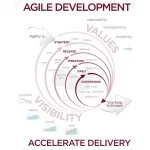Cost Accounting is a Problem for Agile (and Knowledge Work)
The more I work with project portfolio teams and program managers, the more I understand one thing: Cost accounting makes little sense in the small for agile, maybe for all knowledge work. I should say that I often see cost accounting in the form of activity-based accounting. Each function contributes to some of the cost of the thing you’re producing.
Here’s why. Cost accounting is about breaking down a thing into its component parts, costing all of them, and then adding up the costs as you build it. Cost accounting makes sense for manufacturing, where you build the same thing over and over. Taking costs out of components makes sense. Taking costs out of the systems you use to create the product makes sense, too.
Cost accounting makes some sense for construction because the value is in the finished road or building. Yes, there is certainly knowledge work in parts of construction, but the value is in the final finished deliverable.
Software is neither construction nor manufacturing. Software is learning, where we deliver learning as pieces of finished product. When we have finished learning enough for now, we stop working on the deliverable.
Agile allows us to deliver pieces of value as we proceed. Other life cycles, such as incremental life cycles or even releasing your product in short waterfalls allows us to see value as we proceed before the whole darn thing is “done.”
We might need to know about costs as we proceed. That’s why we can calculate the run rate for a team and see how our feature throughput is working. If we start looking at feature throughput and the cost per feature, we can put pressure on ourselves to reduce the size of each feature. That would reduce the cost per feature. Smaller features allows us to learn faster and see value faster.
Cost accounting has a big problem. It does not account for Cost of Delay, which is a huge cost in many organizations. (See Diving for Hidden Treasures: Uncovering the Cost of Delay in Your Project Portfolio to read all about Cost of Delay.)
This is one of the reasons I like feature sizes of one day or less. You count features for throughput and use run rate as a way to estimate cost.
I don’t know enough about accounting to say more. As I learn with my clients and especially learn about the pressures on them, I’ll post more. I do know this: the more we talk about the cost of a feature without talking about its value, the less we understand about how our software can help us. The more we talk about velocity instead of feature throughput, the less we know about what it really costs for us to develop our software.
Cost accounting is about surrogate measures (earned value, the cost of tasks, etc.) instead of valuing the whole. Agile gives us a way to see and use value on a daily basis. It’s opposed to the way cost accounting works. Cost accounting is a problem. Not insurmountable, but a problem nevertheless.
There are alternatives to cost accounting: throughput accounting and lean accounting. To use those ideas, you need to enlist the finance people in an agile transformation. As always, it depends on your goals.
| Reference: | Cost Accounting is a Problem for Agile (and Knowledge Work) from our JCG partner Johanna Rothman at the Managing Product Development blog. |


